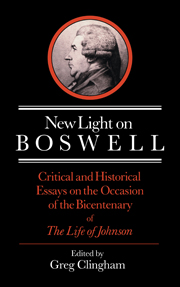 New Light on Boswell
New Light on Boswell Book contents
- Frontmatter
- Contents
- Notes on contributors
- Preface
- Acknowledgements
- Abbreviations
- 1 Introduction: Boswell's ambiguities
- Part I BOSWELL AND EIGHTEENTH-CENTURY SCOTTISH CULTURE
- 2 Boswell and the rhetoric of friendship
- 3 Scottish divines and legal lairds: Boswell's Scots Presbyterian identity
- 4 Boswell and the Scotticism
- 5 Boswell as critic
- Part II CONTEXTS FOR THE LIFE OF JOHNSON
- Part III THE LIFE OF JOHNSON RECONSIDERED
- Index
3 - Scottish divines and legal lairds: Boswell's Scots Presbyterian identity
Published online by Cambridge University Press: 28 October 2009
- Frontmatter
- Contents
- Notes on contributors
- Preface
- Acknowledgements
- Abbreviations
- 1 Introduction: Boswell's ambiguities
- Part I BOSWELL AND EIGHTEENTH-CENTURY SCOTTISH CULTURE
- 2 Boswell and the rhetoric of friendship
- 3 Scottish divines and legal lairds: Boswell's Scots Presbyterian identity
- 4 Boswell and the Scotticism
- 5 Boswell as critic
- Part II CONTEXTS FOR THE LIFE OF JOHNSON
- Part III THE LIFE OF JOHNSON RECONSIDERED
- Index
Summary
In the autumn of 1762, when James Boswell made the famous London jaunt that led to his initial meeting with Samuel Johnson, William Robertson took office as Principal of Edinburgh University. The appointment was a momentous one not only for the university but also for the Church of Scotland and the Scottish Enlightenment. As the leader of the Moderate party in the kirk and author of an acclaimed history of Scotland published in 1759, Robertson, then forty-one years old, was the personification of a new breed of Scots Presbyterian clergymen, the “Moderate literati,” who stood for religious moderation and toleration, polite learning and polite preaching, and other Enlightenment principles, as well as for socially and politically conservative values that endeared them to the landed classes. Robertson's appointment as Principal represented a critical step in the institutionalization of those principles and values. The three decades of “Dr. Robertson's administration,” as Dugald Stewart termed it, saw the heyday of the Scottish Enlightenment. The University of Edinburgh gained international acclaim as a leading center of learning, and the Church of Scotland exchanged its reputation as a hotbed of Presbyterian fanaticism for one as a “hot-bed of genius.” Robertson's Edinburgh was a place to which Scotland's most notorious sceptic and infidel, David Hume, could return late in life without fear of persecution.
Boswell's attitude towards these developments was no simple matter. Attracted to certain aspects of the “enlightened” program of Robertson and the Moderates, he was strongly repulsed by others, to the point of attacking them savagely in anonymous articles in the London Magazine.
- Type
- Chapter
- Information
- New Light on BoswellCritical and Historical Essays on the Occasion of the Bicententary of the 'Life' of Johnson, pp. 28 - 55Publisher: Cambridge University PressPrint publication year: 1991
- 3
- Cited by


